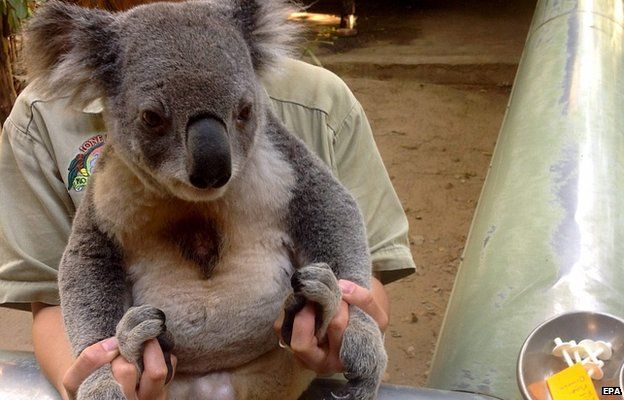Koala chlamydia vaccine trial raises hope
- Published

Australian scientists say they have successfully tested a vaccine aimed at protecting wild koalas from chlamydia.
The disease has ravaged the native marsupial, which is under increasing threat.
Microbiologists in Queensland now hope to protect some of the remaining population after successfully trialling a vaccine developed over five years.
Koala numbers have plummeted in recent years and there are believed to be as few as 43,000 left in the wild.
In some areas, numbers have dropped by as much as 80% in the past 10 years.
The strain of chlamydia that affects koalas can lead to blindness, infertility and death among the animals.
In the trial, microbiologists from the University of the Sunshine Coast in Queensland gave 30 koalas the vaccine while 30 others were left unvaccinated.
All 60 were then fitted with radio collars so they could be monitored in their natural habitat at Moreton Bay, north of Brisbane.
Of the 30 vaccinated, some were already infected with chlamydia, some were healthy and some were showing symptoms of the disease such as eye infections and reproductive tract infections.
Researchers said that seven out of eight koalas suffering from eye infections who received the vaccine showed an improvement.
But in the unvaccinated group, four of six koalas with eye infections saw their conditions worsen.
The researchers also found that koalas infected with the chlamydia strain did not go on to develop the full-blown disease after they were vaccinated.
"It's all very promising and it's not just that it's doing the right thing from an immune response point of view, but it's actually protecting a significant number of them out in the wild climbing around trees," Professor Peter Timms told AFP news agency.
The Australian government has classified the koala as a vulnerable species as its numbers plummeted due to habitat loss, disease and other factors.
Prof Timms said chlamydia was one of the "tipping points" contributing to the decline of the animal and it was crucial to stop its spread.
"The vaccine would actually make a difference," he said.
Researchers intend to continue the trial in areas where koalas are most at risk.
- Published25 April 2013
- Published10 November 2009